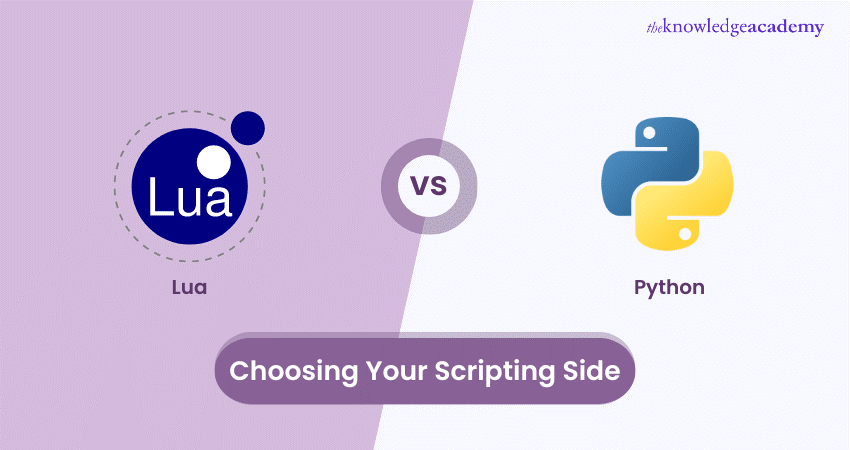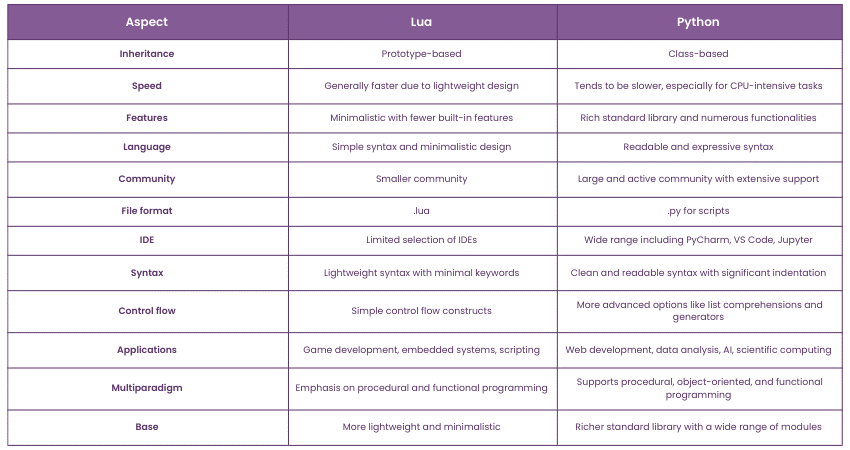We may not have the course you’re looking for. If you enquire or give us a call on +44 1344 203 999 and speak to our training experts, we may still be able to help with your training requirements.
Training Outcomes Within Your Budget!
We ensure quality, budget-alignment, and timely delivery by our expert instructors.

Lua and Python emerge as two powerful contenders, each with its own set of strengths and capabilities. When faced with the decision of which scripting language to adopt, understanding the nuances and differences between Lua vs Python becomes crucial. Lua, with its minimalist syntax and fast performance, finds its niche in embedded systems, game development, and scripting tasks. On the other hand, Python's multi-paradigm nature makes it a favourite for web development, artificial intelligence, and so on.
In this comprehensive blog, we will look into the intricacies of Lua vs Python. You can read this blog to explore their inheritance models, speed capabilities, syntax structures, and more.
Table of Contents
1) What is Lua?
2) Benefits and Drawbacks of Lua
3) What is Python?
4) Benefits and Drawbacks of Python
5) Differences Between Lua vs Python
6) Conclusion
What is Lua?
Lua is a lightweight, high-level, and multiparadigm scripting language. It was designed with embedded systems in mind but has gained popularity in various fields, including game development and web programming. Lua is known for its simplicity, efficiency, and ease of integration into existing codebases.
Benefits and Drawbacks of Lua
Lua, a lightweight and efficient scripting language, offers several advantages and drawbacks that developers should weigh when considering its use. Some of its advantages are as follows:
a) Lightweight: Lua's lightweight nature is one of its standout features. It consumes minimal resources, making it an excellent choice for resource-constrained environments like embedded systems.
b) Efficiency: Due to its minimalistic design and focus on performance, Lua offers fast execution speeds. This efficiency is beneficial for real-time applications like video games, where swift processing is crucial for a seamless user experience.
c) Embeddability: Lua's simplicity extends to its ease of integration with existing applications. It is designed to be embedded within other software, providing scripting capabilities without introducing excessive overhead.
d) Simplicity: Lua boasts a straightforward and intuitive syntax, making it accessible for developers of all levels. Beginners find Lua easy to learn and use, while experienced developers appreciate its simplicity for implementing complex algorithms.
Apart from the advantages discussed, there are certain drawbacks associated with them. Some of them are as follows:
a) Limited libraries: Lua's standard library is smaller compared to languages like Python. This means that developers may need to rely on additional third-party libraries to access certain functionalities.
b) Less popular: Lua may not enjoy the same level of widespread adoption as more mainstream languages like Python. This can lead to fewer resources, tutorials, and community support compared to popular languages.
c) Lack of built-in features: Some developers find Lua lacking in built-in features that are standard in other languages. This can result in more code being written to achieve basic operations or functionalities that are readily available in languages.
Unlock limitless possibilities with our Python Course – book your seat now!
What is Python?
Python is a versatile, high-level, and general-purpose programming language known for its readability and simplicity. It is renowned for its extensive standard library, finds widespread applications in web development, scientific computing, data analysis, artificial intelligence, and numerous other fields. Its syntax prioritises code readability and enables developers to articulate concepts concisely, resulting in streamlined code development processes.
Benefits and Drawbacks of Python
Python, as a versatile and widely used programming language, offers several benefits. Those advantages include the following:
a) Readability: Python's clean and easy-to-understand syntax is one of its most prominent features. Python's readability reduces the time spent debugging and understanding code, enhancing overall productivity.
b) Vast standard library: Python offers a comprehensive standard library, equipping developers with a plethora of pre-built modules for diverse functions. This extensive assortment streamlines typical programming activities, including managing files, manipulating data, and handling network operations.
c) Versatility: Python is a multi-paradigm language, accommodating different programming styles such as procedural, object-oriented, and functional programming. This versatility allows developers to choose the best approach for their projects, adapting to different requirements and coding preferences.
d) Community support: Python supports a large and active community of developers worldwide. This community provides extensive support through forums, tutorials, and documentation.
Along with the advantages, there are certain drawbacks that developers should consider. Some of them are as follows:
a) Speed: Python can be slower compared to languages like C or C++, especially for CPU-intensive tasks. While Python's ease of use is advantageous, developers may encounter performance issues when handling large-scale computations or real-time processing.
b) Global Interpreter Lock (GIL): The Global Interpreter Lock (GIL) in Python can impact its performance in multi-threaded applications. The GIL allows only one thread to execute Python bytecode at a time, limiting the efficiency of multi-core processors.
c) Mobile development: Python is not as prevalent in the mobile development space as languages like Java or Swift. This can restrict Python's usage for creating native mobile applications, leading developers to choose languages more suited for mobile platforms.
Excel in your career with our R Programming Course - register today!
Differences Between Lua vs Python
When it comes to choosing between Python and Lua for your projects, understanding the difference between Lua and Python is essential. Let's explore various aspects where Lua and Python diverge in the following points:

a) Inheritance: Lua employs prototype-based inheritance. While Python utilises class-based inheritance.
b) Speed: Lua is generally faster due to its lightweight design. Whereas Python tends to be slower, especially for CPU-intensive tasks.
c) Features: Lua is minimalistic with fewer built-in features. In contrast, Python's rich standard library and numerous functionalities.
d) Language: Lua offers a simple syntax and minimalistic design. While Python provides a readable and expressive syntax.
e) Community: Lua has a smaller community compared to Python. But Python boasts a large and active community with extensive support.
f) File format: Lua typically uses the .lua file extension. While Python uses .py for scripts.
g) IDE: Lua has a limited selection of integrated development environments (IDEs). Whereas Python offers a wide range such as PyCharm, VS Code, and Jupyter.
h) Syntax: Lua offers lightweight syntax with minimal keywords. While Python provides clean and readable syntax with significant indentation.
i) Control flow: Lua offers simple control flow constructs. While Python provides more advanced options like list comprehensions and generators.
j) Applications: Lua is often used in game development, embedded systems, and scripting. Whereas Python is widely used in web development, data analysis, AI, and scientific computing.
k) Multiparadigm: Lua is multi-paradigm with an emphasis on procedural and functional programming. While Python supports procedural, object-oriented, and functional programming.
l) Base: Lua is more lightweight and minimalistic. In contrast, Python's richer standard library has a wide range of modules.
Conclusion
In the Lua vs Python debate, the choice ultimately depends on the specific requirements of the project. Understanding the differences and strengths of Lua and Python is key to selecting the scripting side that best fits your needs. Whether you lean towards Lua's lightweight efficiency or Python's broad capabilities, both create innovative and efficient solutions.
Level up your web development skills with our ReactJS Course – join us now and become a pro!
Frequently Asked Questions

The choice between Python and Lua depends on the project requirements. Python is popular for its vast libraries and community support, while Lua excels in efficiency and embeddability.

Python can be slower than Lua for some tasks due to its higher-level abstractions. Lua's minimalistic design often results in faster execution speeds, especially for real-time applications.

The Knowledge Academy takes global learning to new heights, offering over 30,000 online courses across 490+ locations in 220 countries. This expansive reach ensures accessibility and convenience for learners worldwide.
Alongside our diverse Online Course Catalogue, encompassing 17 major categories, we go the extra mile by providing a plethora of free educational Online Resources like News updates, Blogs, videos, webinars, and interview questions. Tailoring learning experiences further, professionals can maximise value with customisable Course Bundles of TKA.

The Knowledge Academy’s Knowledge Pass, a prepaid voucher, adds another layer of flexibility, allowing course bookings over a 12-month period. Join us on a journey where education knows no bounds.

The Knowledge Academy offers various Programming Training, including the Python Course, PHP Course, and R Programming Course. These courses cater to different skill levels, providing comprehensive insights into Mobile App Testing Tools.
Our Programming & DevOps Resources Blogs cover a range of topics related to Lua and Python, offering valuable resources, best practices, and industry insights. Whether you are a beginner or looking to advance your Programming & DevOps skills, The Knowledge Academy's diverse courses and informative blogs have got you covered.
Upcoming Batches & Dates
Date

 Halloween sale! Upto 40% off - Grab now
Halloween sale! Upto 40% off - Grab now







 Top Rated Course
Top Rated Course



 If you wish to make any changes to your course, please
If you wish to make any changes to your course, please


